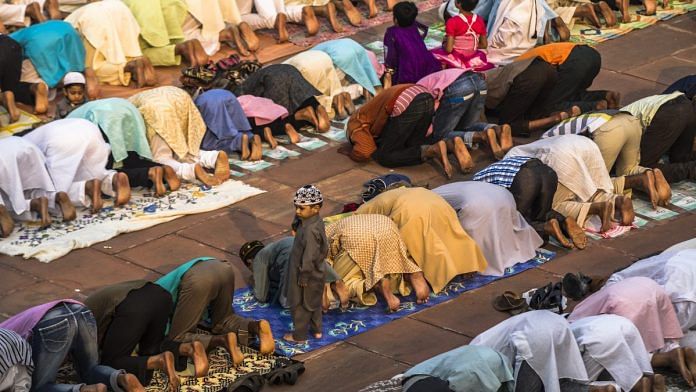It makes sound political sense for the opposition to not oppose Khattar’s remark, but appeasement politics looks at other factors.
Most national newspapers carried a statement made by the chief minister of Haryana, Manohar Lal Khattar, wherein he underscored something that should have been obvious till now.
His statement is reproduced here verbatim: “In our point of view, namaz should be offered at their designated places. Namaz should be offered at mosque and Eidgah. If there is shortage of place for namaz, then it should be offered at personal place. These are not such issues which should be displayed at public places.”
To an unbiased observer, there is nothing wrong with this statement. However, some sections of the media have been quick to take umbrage. There is absolutely nothing that is even remotely unconstitutional or anti-Muslim about what the chief minister has stated. It also makes sound political sense for the opposition to not oppose this remark at all.
However, given the kind of appeasement politics that all political parties apart from the BJP have been indulging in lately, I would not bet on it. It may be instructive to examine this issue from a constitutional standpoint, given that Khattar is the holder of constitutional office in as much as he is the chief minister of Haryana.
The question that we need to answer somewhere is whether there is a constitutional right to perform ‘namaz’ in a public place as far as members of the Muslim community are concerned.
In this regard, it would be instructive to examine the constitutional provision under which the right to Freedom of Religion is granted to all citizens of India. The relevant portion of Article 25 (1) is reproduced as follows:
“Freedom of conscience and free profession, practice and propagation of religion
(1) Subject to public order, morality and health and to the other provisions of this Part, all persons are equally entitled to freedom of conscience and the right freely to profess, practise and propagate religion
(2) Nothing in this article shall affect the operation of any existing law or prevent the state from making any law
(a) regulating or restricting any economic, financial, political or other secular activity which may be associated with religious practice;”
A perusal of the aforementioned provision would make it quite amply clear that the right to Freedom of Religion guaranteed to all persons within the territory of India has been made subject to public order, morality and health. Hence, to perform ‘namaz’ in open spaces, thereby leading to disruption of traffic, is something that is not protected at all under the scheme of our Constitution.
Furthermore, the test laid down by the Supreme Court of India in order to ascertain whether any religious practice is protected under Article 25 (1) is quite succinct. The same has been enunciated by the apex court most recently in the case of Shayara Bano (Triple Talaq) by quoting with approval, the observation of another Constitution Bench of the same court from the 1950s that arose out of the case titled Sardar Syedna Tahir Saifuddin Saheb v. State of Bombay (AIR 1962 SC 853).
The said observations read as follows: ‘In this connection it has to be borne in mind that limitations imposed on religious practices on the ground of public order, morality or health have already been saved by the opening words of Article 25(1) and the saving would cover beliefs and practices even though considered essential or vital by those professing the religion. I consider that in the context in which the phrase occurs, it is intended to save the validity only of those laws which do not invade the basic and essential practices of religion which are guaranteed by the operative portion of Article 25(1)’
There are two takeaways from the aforementioned passage (a) The provision is intended to save the sanctity of practices that are basic and essential to any denominational religion and (b) Even practices considered to be essential to a particular religion can be regulated provided that they violate public order or are a hazard to public health and morality.
Now, it is clear that although praying or offering ‘namaz’ five times a day is essential to the practice of the Islamic faith as it is one of the five pillars of the same, the question is whether offering ‘namaz’ on the road is also something that is an essential component of practice of the Islamic faith.
My sense is that it is not, as I have not come across any Quranic verses or Hadith to this effect. Assuming without conceding that the same is also indeed an essential component of practice, the same would still not be protected under the Constitution, as public order is not to be disturbed under any circumstances, and hence, we can say with reasonable certitude that the chief minister’s statement, as iterated earlier, makes sound constitutional sense.
Raghav Awasthi is an advocate and an RSS member.



